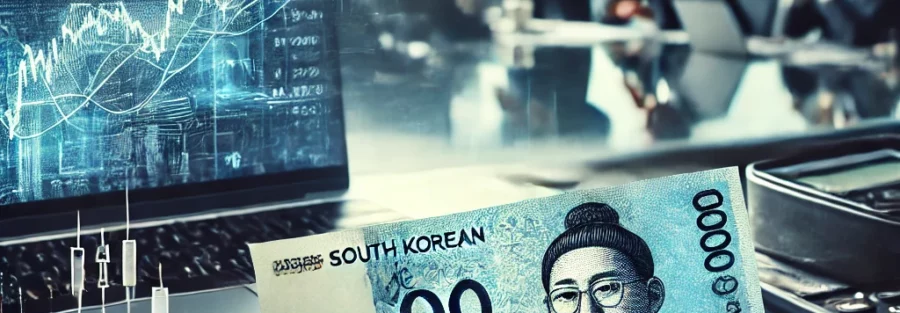South Korea Scrambles to Defend Currency Amid Martial Law Crisis
Minutes after South Korean President Yoon Suk Yeol imposed martial law on Tuesday night, plunging the nation into its most severe crisis in decades, Finance Minister Choi Sang-mok immediately prioritized stabilizing the currency.
By 11 p.m., Choi, who opposed the martial law decision alongside most of the cabinet, convened an emergency meeting at the Seoul Bankers Club. This informal venue brought together key policymakers from the central bank, finance ministry, and financial regulators to coordinate their response.
As soldiers stormed the national parliament, South Korea’s top four financial authorities, referred to as the F4, activated a crisis playbook honed during previous emergencies. Their goal was to avert a massive selloff of the won before Asian markets opened.
Choi spearheaded the discussions, with the Bank of Korea (BOK) taking charge of currency stabilization efforts, according to sources familiar with the meeting.
The government’s first move was swift: an announcement pledging unlimited cash injections into the markets, which helped the won recover from its lowest levels since the 2009 global financial crisis.
“The idea to issue this statement quickly came from BOK Governor Rhee Chang-yong,” said a government official, speaking on condition of anonymity. “Rhee emphasized the importance of acting preemptively, as the news would likely alarm foreign investors more than domestic audiences.”
Over the past four decades, since the last instance of martial law, South Korea has faced several crises. However, the nation has progressively refined its systems, shifting focus from authoritarian measures to prioritizing economic stability and maintaining confidence in its markets. South Korea Draws on 1998 Crisis Lessons to Tackle Currency Turmoil
Lessons learned during the 1998 Asian financial crisis shaped South Korea’s emergency response playbook. That period hit the country hard, exposing its vulnerability to short-term debt and speculative foreign investors. The crisis forced South Korea into what many saw as a humiliating IMF bailout, prompting citizens to donate gold to replenish depleted national reserves.
“We have faced many crises, navigating ups and downs through events like the pandemic, and have developed a robust set of tools,” said a Bank of Korea (BOK) official, speaking anonymously.
The last time South Korea’s four major financial authorities intervened so aggressively in markets was in 2020, when the COVID-19 pandemic disrupted its export-driven economy.
Today, South Korea grapples with sluggish growth, labor strikes, a budget deadlock, and economic challenges from key trade partner China, keeping officials on edge over potential currency volatility.
The won has dropped 9% against the dollar this year, and the KOSPI index has fallen 8%, underperforming compared to other emerging markets. Foreign investors have been withdrawing funds from South Korea’s stock market since August, with outflows exceeding $14 billion over four months.
“They understood the potential for panic, especially among foreign investors, and acted decisively,” said Jon Withaar, who oversees an Asia special situations hedge fund at Pictet Asset Management.
“This approach—offering unlimited liquidity—is now standard for governments and central banks during crises. It’s the same playbook used during the COVID-19 pandemic,” Withaar added.
‘Control Tower’: Finance Minister Choi Takes Charge Amid Chaos
Until this week, Choi Sang-mok was a staunch conservative loyalist in President Yoon Suk Yeol’s cabinet, having held multiple government roles since Yoon’s election in March 2022. Choi began as secretary of the economy division, advanced to chief economic secretary—traveling globally with Yoon—and assumed his current role in December 2023.
During the recent turmoil, Choi emerged as the “control tower,” coordinating messaging and responses through the next day, even as the unfolding crisis led the entire cabinet to offer their resignations.
Sources said the government’s detailed contingency plan outlined actions for virtually every market scenario, starting with reassuring messages to calm markets, followed by targeted funding and rescue operations. However, martial law was not among the scenarios considered in the plan.
Choi was present at a cabinet meeting between 9 p.m. and 10 p.m. on Tuesday, where Yoon’s martial law proposal was discussed. Most cabinet members either opposed the plan outright or voiced significant concerns, according to government officials.
Earlier that day, Choi had attended a forum celebrating South Korea’s inclusion in FTSE Russell’s benchmark WGBI bond index. But by 11 p.m., he had gathered his team at the Seoul Bankers Club to address the crisis, arriving before anyone else.
“Finance Minister Choi came straight from the cabinet meeting at the presidential office. He was adamantly opposed to this irrational plan,” said one official.
“He led the response with remarkable clarity and decisiveness,” added another.
Kang Youngkyu, spokesperson for the ministry, declined to comment on whether Choi had attended the cabinet meeting and opposed President Yoon’s martial law proposal. However, he confirmed that Choi “led the F4 meetings around 11 p.m. on Tuesday and worked with his colleagues throughout the night to review contingency plans.”
The F4 quickly followed up with a series of announcements. The Bank of Korea (BOK) stated it would hold an extraordinary monetary policy board meeting the next morning, while the Financial Supervisory Service announced measures to stabilize the markets.
By 1 a.m. in Seoul, the parliament declared the martial law decree invalid. Nevertheless, the F4 continued with their efforts, holding overnight meetings with their deputies and reconvening at 7 a.m. They pledged to ensure normal market operations, with the financial regulator ready to deploy a 10 trillion won ($7.06 billion) stock market stabilization fund.
The response was largely successful. The won rebounded from its two-year lows, and while South Korea’s stock market had been one of the worst performers among emerging markets this year, it lost just over 2.5% over the past three days.
BOK Governor Rhee expressed relief on Thursday, noting, “The positive outcome is that the situation could have severely damaged foreign investors’ perception of South Korea if martial law had lasted longer. But this was resolved in just six hours.”
($1 = 1,415.4600 won)





